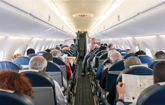NEW YORK, Dec. 13, 2018 /PRNewswire/ -- Leadership at Delta (NYSE: DAL) today will highlight its long-term business strategy and 2019 financial targets at the company's annual Investor Day.
"Delta is leading the way with our powerful brand and unmatched competitive advantages. In 2018, the Delta people have delivered another year of industry-leading financial results, sustained improvement in customer satisfaction and solid returns for our owners," said Ed Bastian, Delta's chief executive officer. "We have a bright future ahead and are confident in our plan for double-digit earnings growth in 2019 of $6 to $7 per share with both top-line growth and margin expansion."
The leadership team will discuss:
- How the company's powerful consumer brand, combined with Delta's unmatched competitive advantages – culture, operational reliability, global network, customer loyalty and an investment-grade balance sheet – create opportunities for sustained revenue and earnings growth.
- Expectations for 2019 profits above $5 billion for a fifth consecutive year, driven by revenue growth and margin expansion, with a 15 percent after-tax return on invested capital.
- Top-line growth in 2019 of 4 to 6 percent, driven by an increasingly diverse revenue stream, premium product mix, and a pipeline of initiatives.
- Non-fuel unit cost growth trajectory improving as efficiency initiatives gain momentum and Delta's fleet transformation continues.
"Delta has a great runway of opportunity as we continue to provide superior travel experiences and industry-leading reliability for our customers" said Glen Hauenstein, Delta's President. "Our pipeline of commercial initiatives and brand momentum drive our expectations for 4 to 6 percent revenue growth in 2019."
Delta will outline its financial framework and introduce financial targets for 2019, including:
- Diluted earnings per share of $6 to $7, with pre-tax margin expansion of approximately 100 basis points at midpoint
- Top-line growth of 4 to 6 percent on 3 percent capacity expansion
- Non-fuel unit cost growth of approximately one percent
"2018 has demonstrated Delta's resiliency as we've overcome 90 percent of a $2 billion headwind from fuel costs" said Paul Jacobson, Delta's Chief Financial Officer. "With a structurally improved business model that produces strong cash generation, we remain committed to continued reinvestment in our business, an investment-grade balance sheet and industry-leading shareholder returns."
The Investor Day event will feature presentations and Q&A sessions with:
- Ed Bastian, Chief Executive Officer
- Glen Hauenstein, President
- Gil West, Chief Operating Officer
- Tim Mapes, Chief Marketing Officer
- Eric Phillips, Senior Vice President – Revenue Management
- Rahul Samant, Chief Information Officer
- Joanne Smith, Chief Human Resources Officer
- Paul Jacobson, Chief Financial Officer
Delta invites shareholders, the investment community and the media to listen to a live webcast of this event today from 8:30 a.m. to 1 p.m. ET. A live webcast will be available at http://ir.delta.com/news-and-events/calendar/. An online replay will be available at the same site shortly after the webcast is complete.
Delta Air Lines serves more than 180 million customers each year. In 2018, Delta was named to Fortune's top 50 Most Admired Companies in addition to being named the most admired airline for the seventh time in eight years. Additionally, Delta has ranked No.1 in the Business Travel News Annual Airline survey for an unprecedented eight consecutive years. With an industry-leading global network, Delta and the Delta Connection carriers offer service to 302 destinations in 52 countries on six continents. Headquartered in Atlanta, Delta employs more than 80,000 employees worldwide and operates a mainline fleet of more than 800 aircraft. The airline is a founding member of the SkyTeam global alliance and participates in the industry's leading transatlantic joint venture with Air France-KLM and Alitalia as well as a joint venture with Virgin Atlantic. Including its worldwide alliance partners, Delta offers customers more than 15,000 daily flights, with key hubs and markets including Amsterdam, Atlanta, Boston, Detroit, Los Angeles, Mexico City, Minneapolis/St. Paul, New York-JFK and LaGuardia, London-Heathrow, Paris-Charles de Gaulle, Salt Lake City, São Paulo, Seattle, Seoul, and Tokyo-Narita. Delta has invested billions of dollars in airport facilities, global products and services, and technology to enhance the customer experience in the air and on the ground. Additional information is available on the Delta News Hub, as well as delta.com, Twitter @DeltaNewsHub and Facebook.com/delta.
Forward Looking Statements
Statements in this investor update that are not historical facts, including statements regarding our estimates, expectations, beliefs, intentions, projections or strategies for the future, may be "forward-looking statements" as defined in the Private Securities Litigation Reform Act of 1995. All forward-looking statements involve a number of risks and uncertainties that could cause actual results to differ materially from the estimates, expectations, beliefs, intentions, projections and strategies reflected in or suggested by the forward-looking statements. These risks and uncertainties include, but are not limited to, the cost of aircraft fuel; the impact of fuel hedging activity including rebalancing our hedge portfolio, recording mark-to-market adjustments or posting collateral in connection with our fuel hedge contracts; the availability of aircraft fuel; the performance of our significant investments in airlines in other parts of the world; the possible effects of accidents involving our aircraft; breaches or security lapses in our information technology systems; disruptions in our information technology infrastructure; our dependence on technology in our operations; the restrictions that financial covenants in our financing agreements could have on our financial and business operations; labor issues; the effects of weather, natural disasters and seasonality on our business; the effects of an extended disruption in services provided by third party regional carriers; failure or inability of insurance to cover a significant liability at Monroe's Trainer refinery; the impact of environmental regulation on the Trainer refinery, including costs related to renewable fuel standard regulations; our ability to retain senior management and key employees; damage to our reputation and brand if we are exposed to significant adverse publicity through social media; the effects of terrorist attacks or geopolitical conflict; competitive conditions in the airline industry; interruptions or disruptions in service at major airports at which we operate; the effects of extensive government regulation on our business; the sensitivity of the airline industry to prolonged periods of stagnant or weak economic conditions; uncertainty in economic conditions and regulatory environment in the United Kingdom related to the exit of the United Kingdom from the European Union; and the effects of the rapid spread of contagious illnesses.
Additional information concerning risks and uncertainties that could cause differences between actual results and forward-looking statements is contained in our Securities and Exchange Commission filings, including our Annual Report on Form 10-K for the fiscal year ended December 31, 2017 and our 10-Q for the quarterly period ended March 31, 2018. Caution should be taken not to place undue reliance on our forward-looking statements, which represent our views only as of December 13, 2018, and which we have no current intention to update.
Non-GAAP Financial Measures
The following tables show reconciliations of non-GAAP financial measures. The reasons Delta uses these measures are described below. Reconciliations may not calculate due to rounding.
Delta sometimes uses information ("non-GAAP financial measures") that is derived from the Consolidated Financial Statements, but that is not presented in accordance with accounting principles generally accepted in the U.S. ("GAAP"). Under the U.S. Securities and Exchange Commission rules, non-GAAP financial measures may be considered in addition to results prepared in accordance with GAAP, but should not be considered a substitute for or superior to GAAP results. The tables below show reconciliations of non-GAAP financial measures used in this presentation to the most directly comparable GAAP financial measures.
We do not reconcile certain forward looking non-GAAP financial measures because mark-to-market ("MTM") adjustments and settlements will not be known until the end of the period and could be significant.
Pre-Tax Income, Adjusted
We adjust pre-tax income for the following items to determine pre-tax income, adjusted:
Mark-to-market ("MTM") adjustments and settlements. MTM adjustments are defined as fair value changes recorded in periods other than the settlement period. Such fair value changes are not necessarily indicative of the actual settlement value of the underlying hedge in the contract settlement period. Settlements represent cash received or paid on hedge contracts settled during the period.
Equity investment MTM adjustments. We record our proportionate share of earnings/loss from our equity investments in Virgin Atlantic and Aeroméxico in non-operating expense. We adjust for our equity method investees' MTM adjustments to allow investors to better understand and analyze our core operational performance in the periods shown.
Year Ended |
Year Ended |
Year Ended |
|||||||
(in billions) |
December 31, 2017 |
December 31, 2016 |
December 31, 2015 |
||||||
GAAP |
$ |
5.5 |
$ |
6.4 |
$ |
7.2 |
|||
Adjusted for: |
|||||||||
MTM adjustments and settlements |
(0.3) |
(0.4) |
(1.3) |
||||||
Equity investment MTM adjustments |
0.1 |
(0.1) |
- |
||||||
Total adjustments |
(0.2) |
(0.5) |
(1.3) |
||||||
Non-GAAP |
$ |
5.3 |
$ |
5.9 |
$ |
5.9 |
|||
SOURCE Delta Air Lines
Related Links
WANT YOUR COMPANY'S NEWS FEATURED ON PRNEWSWIRE.COM?
Newsrooms &
Influencers
Digital Media
Outlets
Journalists
Opted In





Share this article